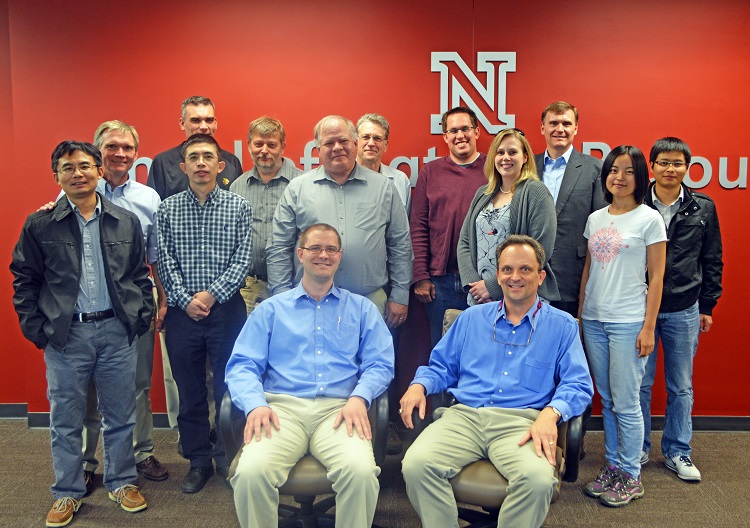
SNR hosted an Environmental Characterization Workshop from Sept. 16-18 in Hardin Hall on UNL's East Campus and at UNL's Agricultural and Research Development Center in Mead, Nebraska.
As a result, one of the world's premier mesoscale numerical weather prediction models and one of the premiere land data assimilation systems are now housed on the University of Nebraska's HPC enterprise infrastructure.
All UNL/UNO/UNK/PKI faculty, staff and students can now request an account on one of the Holland Computing Center's clusters to use the NASA Unified Weather Research and Forecasting (NU-WRF) mesoscale model and the NASA Land Information Systems (LIS) data assimilation framework.
These analysis and forecasting systems will enable interdisciplinary research, enhance classroom instruction, and help to develop new tools for outreach and extension.
"Overall, the workshop objectives were met and it was deemed a large success by everyone who participated," said Eric Hunt, workshop organizer and staff scientist at Atmospheric and Environmental Research.
The workshop had several objectives: bring together leading aerosol experts at the National Center for Atmospheric Research (NCAR), the NOAA Earth System Research Laboratory and UNL for an aerosol plenary session to discuss a way ahead for the Air Force Weather Agency (AFWA) Point Analysis Intelligence System project, introduce stakeholders to the Mead Testbed concept, and obtain the software baseline of NU-WRF and LIS for use by UNL faculty, staff and students.
"All of those objectives were met," Hunt said. "A white paper was delivered to the government as a result of the aerosol session, which laid the groundwork for a way ahead on a project of high importance to the intelligence community. All of the visiting scientists were quite impressed with the facilities and research being conducted at UNL's Mead Agricultural Research and Development Center."
Hercules, a field sprayer converted into a mobile remote sensing research platform by Art Zygielbaum, research associate professor, and the stationary and mobile cosmic-ray soil sensors used to monitor soil moisture by Trenton Franz, assistant professor, were of particular interest.
Todd Schimelfenig, research technologist, also impressed the visiting scientists with the instrumentation related to the ongoing Carbon Sequestration Program at UNL.
As a result of the visit, research scientists at NASA-GSFC, NCAR, and elsewhere are using data from Mead for validation of earth system model output.
The last day of the workshop was a joint venture between SNR and EAS. Tricia Lawston (University of Delaware) and Joe Santanello (NASA-GSFC) presented a summary of their Central Plains irrigation modeling case study. This case study led to a vigorous discussion with Robert Oglesby, climatologist; Ayse Kilic, hydrologic information systems specialist; and other SNR, EAS, and agronomy faculty on the current issues with land cover maps, among other topics.
After the workshop was complete, an interdisciplinary team of UNL faculty worked with Christa Peters-Lidard, Deputy Director for Hydrospheric and Biospheric Sciences in the Earth Sciences Division at NASA-GSFC, to acquire and port the software baselines of LIS and NU-WRF onto the University of Nebraska's HPC infrastructure.
Faculty included Jerry Wegiel (SNR), Jun Wang (EAS/SNR), Adam Caprez (HCC), and Dave Swanson (HCC).
"Much praise also goes to John Carroll (SNR director), Kurt Preston (Associate Vice Chancellor for Research), and terrific SNR staff like Karen Jensen, Sharon Kelly, and Jacki Loomis for ensuring this workshop was a success," Hunt said.
In all, 58 people participated in the workshop, many of whom represented departments across the university including the School of Natural Resources, the Department of Earth and Atmospheric Sciences, the Department of Agronomy and Horticulture, the Department of Biological Systems Engineering, among others. Visiting scientists came from NCAR, NOAA, AFWA, NASA-GSFC, CRREL, and University of Delaware.
Questions regarding the workshop can be directed to Hunt at 402-294-3616 or ehunt@aer.com.
— written by Eric Hunt
— edited by Mekita Rivas, Natural Resources